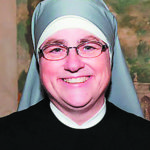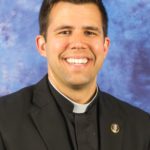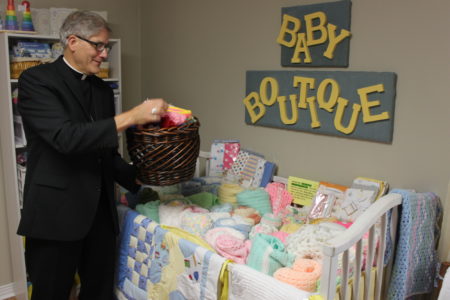By Abbey Schuhmann
COVINGTON, La., – On Saturday, March 25, more than 300 teens and adult leaders from around the Diocese of Jackson traveled to St. Joseph Abbey and Seminary College in Covington, La., for the 2017 Abbey Youth Festival (AYF). The 16th annual festival fell on the Solemnity of the Annunciation of the Lord and this year’s theme was “Be It Done Unto Me.”
The seminarians at St. Joseph Seminary College play a vital role in the production of AYF including our own, Andrew Bowden, Hayden Schmitt, and Tristan Stovall. The festival has grown over the years and now hosts around 250 groups from all across the south with more than 4,500 participants coming together each year for a day-long event to experience music, prayer, catechesis, fellowship and fun.
With the torrential rain and devastating floods that affected the Covington-area last spring, the 2016 festival was cancelled for the first time in its history. While this year’s forecast was not ideal for an outdoor event, accommodations were made and the program continued.
The teens and adults from our diocese remained optimistic and weathered the storm throughout the day determined to experience all the festival has to offer. The program featured keynote presentations from Katie Prejean McGrady, Stephanie Grey and David Calavitta. Dave Moore and The Josh Blakesley Band entertained the crowd with awesome music. Each speaker shared thoughts regarding the theme, “Be It Done Unto Me,” on how we all have a call to serve the Lord, how do we discern that call in our daily lives and how can we live as faithful sons and daughters of our Lord.
Participants have the opportunity throughout the day to visit different vendor booths including religious orders and communities from all around the country. Groups also have the opportunity to tour the beautiful Abbey church on campus. The event focuses on evangelization and faith formation through vocational discernment, prayer, and catechesis.
The entire event ends with Mass and candlelight adoration; often times the highlight of the event for most participants. This year the Mass was celebrated by Bishop Shelton J. Fabre of the Diocese of Houma-Thibodaux and the homilist was Father Joshua Johnson of the Diocese of Baton Rouge. Father Johnson challenged the teens to become fully alive in Jesus Christ. He gave witness to this through his own, personal vocation story as well as stories that he shared that have impacted him throughout the years.
He suggested the teens follow “The 5 W’s” in order to help them enter into a deeper relationship with Christ.1. When will you pray and spend time with the Lord? 2. Where will you pray? 3. What will you do? Read scripture, attend adoration, spend time with the Blessed Sacrament after mass – were just a few of his suggestions. 4. Who will be your accountability partner? 5. Why are you going to do this? To become fully alive in Christ.
It was no doubt a wet and soggy day for our group, however; the weather did not dampen our experience with Abbey Youth Festival 2017. This event is an excellent opportunity for our teens to see the bigger church and fellowship with other young Catholics. This was the 7th year for our diocese to sponsor a trip to the Abbey Youth Festival. Make plans to participate in the 2018 event scheduled for Saturday, March 17th!
(For more information visit www.abbeyyouthfest.com or contact Abbey Schuhmann in the Office of Youth Ministry – 601-949-6934 or Abbey.Schuhmann@jacksondiocese.org)





